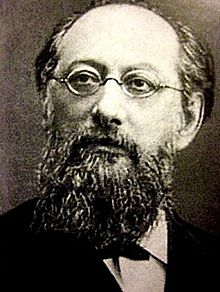- Mark Natanson
-
Mark Natanson 
Born January 6, 1851
RussiaDied July 29, 1919 (aged 68)
SwitzerlandMark Andreyevich Natanson (Russian: Марк Андреевич Натансон; alias - Бобров, or Bobrov) (December 25, 1850 (N.S. January 6, 1851), Švenčionys - July 29, 1919, Berne) was a Russian revolutionary and one of the founders of the Circle of Tchaikovsky, Land and Liberty, and the Socialist-Revolutionary Party. In 1917 he was a leader of the Left Socialist-Revolutionaries, supporting the Bolsheviks in the October Revolution.
He was the uncle of Alexander Berkman.
Natanson studied in St Petersburg at the Medical and Surgical Academy (1868-71) and at the Institute of Agriculture (1871). During this time he became involved in radical student politics. He opposed the 'nihilistic' tendency of Sergei Nechaev. Natanson participated in founding the vand the populist (Narodnik) organisation 'Land and Liberty' and helped organise some of the first socialist groups among the small industrial working class in Western Russia. He also took part in demonstrations, notably the Kazan demonstration in St Petersburg in 1876. After 'Land and Liberty' split, Natanson joined 'The People's Will' (Narodnaya Volya). That group favoured agitation among urban workers and intellectuals over propaganda among the peasants (a tactic adopted by the other offshoot of 'Land and Liberty', the 'Black Repartition' group). Narodnaya Volya also endorsed political terrorism as a tactic and in 1881 assassinated Tsar Aleksandr II.
Natanson was not involved in any terrorist act, but, in 1869 he was imprisoned in the notorious Peter and Paul Fortress (mainly used as a political prison), and from 1879 to 1889, he was banished to Siberia.
After his release he returned to European Russia and became active in Minsk, where in 1893 he founded the party 'The People's Right' ('Narodnaya Prava'). Like 'The People's Will' its focus was urban rather than rural, but unlike 'The People's Will', it did not engage in terrorism. In 1894 Natanson was arrested again and banished to eastern Siberia. In 1904, after his release, Natanson went into exile in Switzerland and there became involved in the Socialist-Revolutionary Party (PSR), which united a variety of populist and revolutionary organisations.
The tactical position adopted by the PSR represented a compromise between the rural agitation favoured by South Russian and Ukrainian populists, the factory organisation favoured by 'The People's Right' and the terrorist tactic embraced by the remnants of 'The People's Will' and some of the revolutionary groups of Moscow and St Petersburg. During the abortive Russian revolution of 1905-1907, Natanson returned to Russia and served on the central committee of the PSR. After the revolution was put down, Natanson returned to exile in Switzerland.
When the First World War broke out in 1914, the PSR, like most other European socialist parties, split into those who supported a war of 'national defence' ('Defencists') and those who opposed the war ('Internationalists'). Natanson sided with the 'Internationalists' and attended the international socialist peace conferences such as the Zimmerwald Conference and one at Kienthal in Switzerland, signing the conference's manifestoes on behalf of the SR Internationalists.
When the February Revolution occurred in Russia in 1917, Natanson returned to Russia and became one of the most prominent leaders of the left wing of the PSR, which became increasingly disenchanted with the Provisional Government and with Alexander Kerensky. The Left SRs eventually broke away from the PSR and formed a separate party. Natanson and the Left SRs supported the Bolshevik Revolution in October of 1917 and briefly entered the Soviet government. However, they rejected the Soviet-German peace treaty of Brest-Litovsk (later superseded by the Versailles treaty), which imposed onerous terms on Russia in exchange for a separate peace with Russia.
The Left SRs exited the Soviet government in protest, and some now took up arms against the Bolsheviks. Natanson opposed this course, fearing that a defeat of the Soviet government would spell the end of the revolution and usher in a counter-revolution. He founded the party of Revolutionary Communists, which supported the Bolsheviks and eventually merged with the Communist Party of the USSR. Natanson was a member of the Presidium of the All-Russian Central Executive Committee. However, Natanson's opposition to the anti-Bolshevik uprising of the Left SRs did not imply whole-hearted acceptance of the Bolsheviks' policies. In particular, he objected to Lenin's decision to ban all other political parties in the Soviet Union. In 1919 he once again returned to Switzerland and died there.
References
- The Great Soviet Encyclopedia, 3rd Edition, Moscow, 1970-1979.
- Aptekman, O. V. “Dve dorogie teni: Iz vospominanii o G. V. Plekhanove i M. A. Natansone kak semidesiatnikakh.” Byloe, 1921, no. 16.
- Figner, V. N. “M. A. Natanson.” Poln. sobr. soch. vol. 5. Moscow, 1932.
- Itenberg, B. S. Dvizhenie revoliutsionnogo narodnichestva. Moscow, 1965.
External links
Categories:- 1851 births
- 1919 deaths
- People from Vilnius County
- Socialist-Revolutionary Party members
- Narodniks
- People of the Russian Revolution
- Russian socialists
- Jewish socialists
Wikimedia Foundation. 2010.
